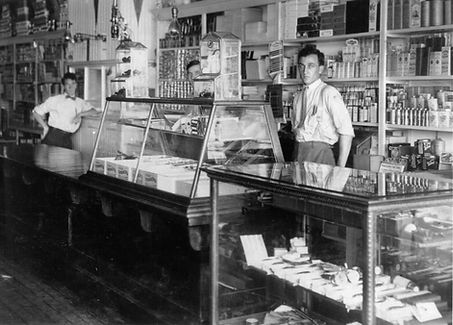

Dedicated to promoting the discovery and preservation of the rich history of the people, events, and places that make up Wisconsin's Last Wilderness.


Company Town Money.
A "Company Town" is a place where in this case the store and many of the homes were owned by the main employer, Vilas County Lumber Company (VCLCo).

Company Town Recreation Hall

Company Town Store
Company Town Coins of Fosterville/Winegar Wisconsin.




Company Store
Fosterville/Winegar (now Presque Isle) was a company town where practically all businesses and houses were owned by the Lumber Companies which were also the main employers. The companies coined its own money which could be used for goods at the Company Store, the Recreation Hall, and any other company owned businesses.
Employees were paid in company tokens (known as Ginseng by residents). The use of tokens as pay was a benefit to the lumber company in several ways; simply as pay, employee benefit, profit maker, or as an expeditious means of bookkeeping. The VCLCo “Company Store” handled employee accounts and dispensed the tokens, eliminated the need to have cash on hand and it forced employees to use the company store for most, if not all, purchases, which were usually at higher prices than could be found elsewhere. In this situation, the Company Store had the advantage to the employee do to the remoteness of the village of Fosterville/Winegar which precluded traveling to the nearest town (Mercer) to buy goods. The employees saved money in the long run because they didn’t have to buy a train ticket and stay overnight in Mercer.
Therefor employees usually saved money in the long run by buying at the company store, not having to travel or pay for a train ticket and overnight lodging.
In 1912, an employee of the Vilas County Lumber Company, was fired by W. S. Winegar for buying by mail from Montgomery Wards in Chicago, and shipped American Express to Winegar, instead of purchasing from the VCLCo “Company Store.
Many of the people that came to the township of Presque Isle were from economically depressed areas, especially Kentucky. The company controlled much of their life including even the color of their homes. The influence of the company on the lives of the residents helped them feel united and protected.
Lumberjacks at the turn of last century were no different than wage earners of today, except they didn’t have access to credit cards or a credit union. When their money ran out they could obtain an advance in tokens, to be deducted from their next months salary. The tokens were usually non-transferable (to prohibit gambling, or selling at a cash discount), and were many times only deducted from an employees account when they were turned in on purchases. By this means, a lost token was not deducted from wages; only a spent token was accountable. Some companies discounted tokens as much as 20% for cash. But there are stories of counter fitting.
Fosterville, Wisconsin, Vilas County Lumber Company
J. J. Foster, first VCLCo President, tokens:
-
Good For / 1 / In Merchandise - 20 mm, Round, Brass
-
Good For / 5 / In Merchandise - 21 mm, Round, Aluminum
-
Good For / 10 / In Merchandise - 24 mm, Round, Aluminum
-
Good For / 25 / In Merchandise - 29 mm, Round, Aluminum
-
Good For / 50 / In Merchandise - 33 mm, Round, Aluminum
-
Good For / 1.00 / In Merchandise - 38 mm, Round, Aluminum
Winegar, Wisconsin, Vilas County Lumber Company
W. S. Winegar, second VCLCo President, tokens:
-
Good For / 5¢ / In Trade / Recreation Hall - 29 mm, Triangle, Brass
-
Good For / 5 / In Merchandise - 21 mm, Round, Aluminum
-
Good For / 1.00 / In Merchandise - 38 mm, Round, Bimetal (brass rim)
Winegar, Wisconsin, Bonifas-Gorman Lumber Company
W. Bonifas, President, tokens:
-
Good For / 25¢ / In Merchandise - 27 mm, Round, Aluminum
-
Good For / 50¢ / In Merchandise - 30 mm, Round, Aluminum
-
Good For / $1.00 / In Merchandise - 35 mm, Round, Aluminum
Dollar coins were called “Wagon Wheels.” A ten cent piece of Ginseng would fit in the quarter slot machines at the Winegar Recreation Hall...........








